Sustainability
Ambitions and goals
SpareBank 1 SMN wishes to stimulate the sustainable development of Central Norway. The group’s ambition is to set the standard for sustainability in finance in our region, and it has committed to integrating the UN principles for responsible banking into both its business strategy and core activities.
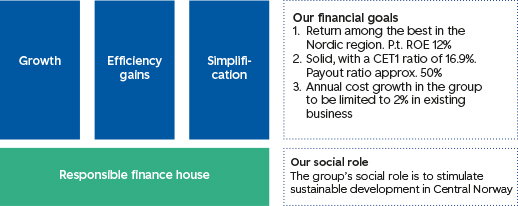
At the start of 2021 the group’s focus is on concretising short- and medium-term goals that will ensure realisation of the long-term goals.
SpareBank 1 SMN’s sustainability strategy is designed to make the group’s financial goals achievable and to create value for customers, owners and employees by being a:
- Driver for the green transition
- Partner for an inclusive development of society
- Guide for responsible business culture
Goals of the group’s sustainability strategy:
| Driver | Partner | Guide |
| Reduce the group’s direct and indirect CO2 emissions in keeping with national obligations under the Paris Agreement. | Profile international worker and human rights. The group promotes inclusive and sustainable innovation. | Maintain an efficient, responsible and open business culture at all levels. |
| Finance house | Finance house | Finance house |
| At least 50% reduction by 2030. |
A workforce that reflects the diversity of the population by 2030. | Zero tolerance of breaches of the group’s ethical standards. |
| Customer offering | Customer offering | Customer offering |
| Share of lending/turnover that qualifies as sustainable economic activity. | Share of lending/turnover that qualifies as sustainable economic activity. | Share of lending/turnover that qualifies as sustainable economic activity. |
Sustainability is integrated into all aspects of the group through a framework comprising the three basic pillars of our business:
- Daily operations and organisation culture of the finance house
- Products and services making up the customer offering
- Ownership model and community dividend
Framework for integration of sustainability:
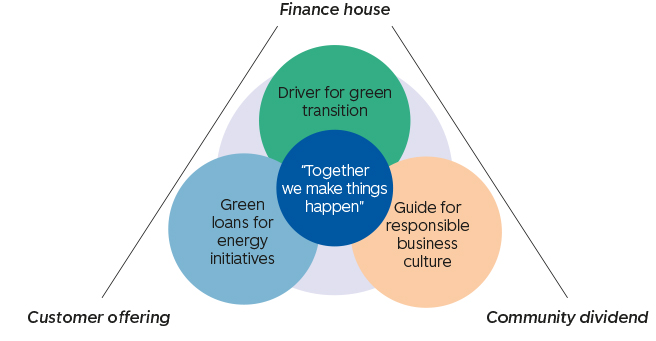
Organisational set-up
The sustainability effort is organised through a steering committee. The committee consists of key personnel from each business line in the group. The committee chair is the group’s sustainability officer. The sustainability officer shall inter alia be:
- Adviser to the group CEO and the group management team
- Head of the group’s steering committee for sustainability (ESG committee)
- Contact person for customers and suppliers in matters of sustainability
- Oversee the work of integrating sustainability into the group’s business lines
The sustainability officer reports to the finance director. The steering committee reports to the group management team of SpareBank 1 SMN.
Commitments, policies and procedures
The group supports the following national and international agreements:
- UN Sustainability Goals
- Paris Agreement
- ILO Conventions 100 and 111
- UN Convention on Economic, Social and Cultural Rights
- Working Environment Act
- Equality and Anti-Discrimination Act
As at 31 December 2020, SpareBank 1 SMN has signed and/or given its endorsement to the following principles and standards:
- UN Principles for Responsible Banking
- UN Global Compact
- Task Force on Climate Related Financial Disclosure
- Global Reporting Initiative
- Environmental Lighthouse Foundation
SpareBank 1 SMN has published a sustainability library at www.smn.no. This gives an overview of key documents governing compliance with the group’s sustainability strategy.
Significant themes and the group’s influence on its surroundings
Significant themes of the group’s sustainability effort form the basis for prioritising new initiatives:
| Prioritised significant themes | Additional themes |
| Prevent economic crime and corruption | Competence boost for customers |
| Stimulate the green transition in customer offerings | Ethical standards |
| Stimulate innovation and sustainable economic growth | Data and cyber security |
| Equality and diversity | Standards for purchasing and marketing |
| Develop competence of group employees | Green transition in the finance house |
The group has conducted its first influence analysis to identify the customer offering’s positive and negative impact on the group’s surroundings.
In summary:
- Today’s customer offering has both negative and positive impacts on the surroundings
- The positive impact arises mainly within the social dimension of sustainability (S)
- The negative impact arises mainly within the climate and environmental dimension (E)
- The governance dimension (G) is not addressed as part of the customer offering
On an overall level the results from this analysis affirm the insight acquired by the group through interviews under the materiality assessment.
Prioritised sustainability goals
SpareBank 1 SMN employs a broad approach in its work on the UN sustainability goals, but based on the knowledge acquired by the group, the following goals are particularly important:
- Positive impact
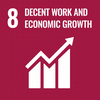
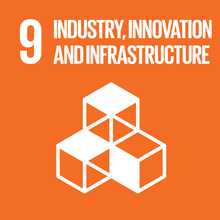
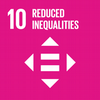
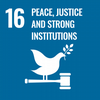
- Reduce negative impact
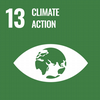
- SpareBank 1 SMN’s vision – ‘Together we make things happen’ – underscores sustainability goal no. 17 as a key process goal in the group’s sustainability effort.
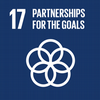
Climate risk assessments
The group utilises an assessment both of the impact of climate change on the company (financial), and of the company’s impact on climate change (environmental).
SpareBank 1 SMN utilises the TCFD framework to identify, monitor and manage climate risk. The work on a climate risk strategy is ongoing and will be published in the sustainability library at smn.no upon decision by the bank’s board of directors. For the position regarding the group's climate risk strategy, see the relevant section in the chapter 'Responsible operations and management'.
Central sustainable governance indicators
The group is in the process of developing a coherent, overall governance model to ensure follow-up of both financial and non-financial goals. The business lines report on a quarterly basis, and the bank’s board of directors receive semi-annual status reports on the implementation of the sustainability strategy.
The strategy process and the updated materiality analysis have been aligned to the group’s GRI index. The GRI index for 2020 is therefore changed compared with the index for 2019. The 2020 GRI index is annexed to this annual report.
Significant sustainability activities in 2020
A description of new, significant measures and activities in the group’s sustainability effort in 2020 is included in the respective business lines’ chapters in this annual report.
| Finance house | Customer offering | Ownership model and community dividend |
| Revised framework and issuance of green bond | ESG analysis tool for classification of the corporate portfolio | Collective Covid-19 response efforts |
| Group-wide climate and energy account | Development of climate calculator for retail customers | New investment strategy and organising of the community dividend department |
| Revised credit strategy, group | Sustainability barometer | |
| Climate risk strategy, group | Sustainability labelling of mutual funds | |
| E-learning to strengthen employees’ sustainability competence | New green products for businesses and retail customers | |
| Changes in purchasing standards | Trondheim municipality makes SpareBank 1 SMN its main bank | |
| Mortgage payment holidays for corporate and retail customers | ||
| Advances of unemployment benefit |

 Previous
Previous
